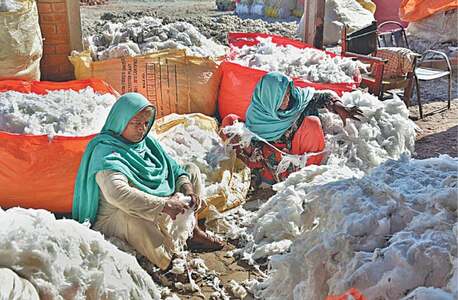LAHORE: Pakistan has so far produced 8.2 million bales of cotton as both Punjab and Sindh provinces have had almost equal output during 2023-24.
The Pakistan Cotton Ginners Association (PCGA) on Thursday reported that the country produced 8.258m bales by Jan 15, which is 3.3m bales or 67 per cent more than the total yield of the previous crop year when the country could produce only 4.9m bales mainly due to devastating rains and floods in the cotton belt.
Sindh has so far yielded 4.1m bales, just 57,000 bales less than Punjab, which usually produces more lint than the former.
Of them, exporters, including a private company, have purchased 292,000 bales, textile mills 7.478m bales, while ginners are still holding 487,000 bales. Presently, 165 ginning factories are operational.
Karachi Cotton Brokers Forum chairman Naseem Usman believes that the total cotton production will be around 8.4m bales. However, if ‘unregistered’ bales are counted, then the production will touch the 9.5m bales mark.
Cotton Ginners Forum Chairman Ihsanul Haq said that despite lower cotton acreage Sindh has produced lint almost equal to Punjab and may surpass it in the next crop year as more growers will be attracted towards the cash crop.
Conservative estimates put domestic consumption of lint at around 12.5m bales. The delivery of 1.6m bales of cotton imported last year is still pending, while 0.8m more bales are expected to be imported through land routes.
Mr Usman says that due to rising prices of cotton in the domestic market, textile mills have started importing cotton, which is relatively cheaper. He estimates that import contracts for about 0.4m bales have been signed during the last month and more contracts are in process. But tensions at the Pakistan-Afghan borders have created concerns among the importers because thousands of vehicles laden with cotton and other commodities are stuck up damaging perishable items, he adds.
Mr Haq says that the textile industry will have to import cotton on a large scale because the local lint output has fallen short of the target, while local textile mills have secured export orders worth around $3 billion at the Heimtextil Messe (fair) recently held in Frankfurt, Germany. At least 277 Pakistani mills participated in the fair.
He says that the domestic cotton market will become hotter, making the textile industry rely more on imports as power rates for the textile export sector are likely to be reduced on the recommendations of the Special Investment Facilitation Council (SIFC), while markup rate on banks loans for the sector may also be cut.
Published in Dawn, January 19th, 2024













































Dear visitor, the comments section is undergoing an overhaul and will return soon.